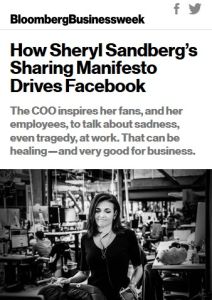Join getAbstract to access the summary!

Join getAbstract to access the summary!
Sarah Frier
How Sheryl Sandberg’s Sharing Manifesto Drives Facebook
The COO inspires her fans, and her employees, to talk about sadness, even tragedy, at work. That can be healing – and very good for business.
Bloomberg Businessweek , 2017
What's inside?
Are vulnerability and professionalism compatible? Sheryl Sandberg says sharing is good for business.
Recommendation
Is it okay to cry at work? Sheryl Sandberg has famously said yes, and in her book, Option B: Facing Adversity, Building Resilience, and Finding Joy, she argues that workplaces should make room for even the most difficult emotions. Personal sharing boosts the bottom line, Sandberg says, forging bonds of trust between co-workers and customers and enhancing leaders’ soft power. Bloomberg News journalist Sarah Frier traces Sandberg’s rise from Google exec to globally influential workplace “culture shifter,” explaining how Facebook’s COO has come to embody the company’s mission “to make the world more open and connected.” getAbstract recommends this article to leaders, female professionals and anyone who wonders if emotions belong in the workplace.
Summary
About the Author
Sarah Frier is a San Francisco–based technology reporter for Bloomberg News, covering Facebook, Twitter, Snapchat, and start-ups.






















Comment on this summary